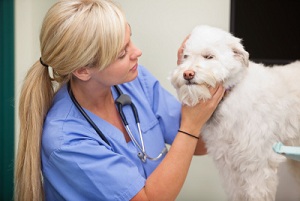- Home
- About Us
- Contact Us
- Privacy Policy
- What's New!
Choosing a Veterinarian
for Your New Dog
If you’ve never had a pet before, choosing a veterinarian is one of the first things you’ll want to do when you get a new dog. It's not a good idea to wait until your dog is sick and needs attention. Developing a relationship with your vet is important so that he’ll know your dog when his services are needed.

The ABC's of Choosing a Veterinarian
The best way I know of choosing a veterinarian is to get a referral from someone who’s had a good relationship with a particular vet for several years. Ask your friends, family members, and neighbors about their experiences (good and bad) with local vets.
Whenever possible, select a veterinarian near you. If there’s an emergency, you’ll want to be able to get to your vet quickly.
I like and recommend holistic veterinarian whenever one is available in your area. If you can’t find on locally, you may choose a regular vet for everyday needs. But whenever your vet recommends a treatment that you’re not comfortable with, I recommend consulting with holistic vet.
What is a Holistic Veterinarian?
Choosing a veterinarian that uses a holistic approach is not like choosing a conventional vet. A holistic veterinarian considers all aspects of your dog’s life when examining and diagnosing him.
The holistic vet will also consider a combination of conventional treatments with complimentary (or alternative) kinds of treatments for you pets.
These alternative kinds of treatment may include:
- Acupuncture...the form of ancient Chinese medicine has been used for thousands of years and today is used by billions of people as their primary health care.
- Homeopathy...and alternative approach that uses minute quantities of certain elements (plants, minerals, drugs, etc.) to treat the deepest causes of a disease.
- Nutritional Therapy...Proper nutrition is considered the best preventative medicine.
- Herbal Medicine...the use of specific herbs and plants for medicinal purposes.
- Behavior Modification...this includes modern psychology, lifestyle evaluation, biology and nutrition.
- Others...can virtually include any type of holistic treatment used for humans.
A veterinarian that uses the holistic approach is interested in...
- the genetics of your dog
- Nutrition (what your dog is eating)
- Relationships of your family with the dog (and between pets)
- Hygiene (how clean is the environment that your dog lives in?)
- Any stress factors at home.
What are the benefits of the holistic approach?
- It’s very humane...the techniques used are gentle, and minimally invasive
- It is focused on reducing stress in the patient
- It’s centered on love, respect, and empathy for the patient (your dog).
Holistic vets are much more likely to search for “natural” solutions to your pet’s ailments rather than rushing into drug-therapies. To find a holistic vet in your area visit: www.ahvma.org.
Choosing a veterinarian should not be taken lightly. You want the best care there is for your pets and overall I think the best care is provided by a vet using holistic methods.
Visit your veterinarian as soon as possible
After choosing a veterinarian, take your dog in for complete checked up. This should be done within 48 hours of bringing your dog home. I recommend this even if the previous owner claims that the dog has been checked out.
It’s just the wise thing to do.
When you take your puppy to his first visit, bring a fresh stool sample for the vet to check. The best way to collect the sample is to take a small plastic bag; turn it inside out in your hand; collect the stool; turn the bag right-side out and secure the bag with a tie (or zip it closed if it’s a zipper-lock type bag).
At your first visit, make sure...
- that you leave feeling very comfortable with the vet and their staff;
- that all your questions were adequately answered;
- and that your puppy was treated gently and professionally.
- If anything about the visit bothers you, find another veterinarian. There's nothing that says you have to go back to that one.
Before you leave, make sure you understand your vet’s policies and procedures for after-hours emergencies. How long is it likely to take for your dog to get help if there is an emergency when your veterinarian’s office is closed?
Get your puppy vaccinated as soon as possible
As a good parent, you’ll want to get your puppy immunized with all the required vaccinations as soon as possible. The vaccination program should begin when your puppy is between 6 and 9 weeks of age.
If you expect that you’ll ever need to board your dog at a kennel, make sure that you’re getting all the vaccinations they may require.
After your puppy is vaccinated for rabies, be sure to get his county tag confirming the vaccination and be sure to attach it to his collar.
Get your puppy spayed or neutered as soon as possible
Unless you intend to professionally breed your dog, you should definitely have your puppy neutered or spayed. There are many benefits, not the least of which is helping to control the over-population of dogs.
It is best to have your female spayed before her first heat at about 6 months of age. Your male dog should be neutered between 6 months and 1 year of age. Check with your veterinarian for his/her specific recommendation for your puppy.
- If your dog is already an adult, it’s not too late to have them neutered. It’s just that the chances for a complication related to the surgery are somewhat greater with an adult dog than with a puppy. But the benefits still outweigh the slight risk.
- The costs range from $65 to $180 with neutering on the lower end and spaying on the higher end. This is because spaying a female is a more involved surgery than neutering a male. The operation for both will require an overnight stay with your dog being anesthetized during the procedure.
- Neutered dogs are better behaved than their un-neutered counterpart. This is because the neutered dog is no longer preoccupied with finding a mate and breeding. This results in a dog that is happy to stay home, instead of continually looking to escape in search of a date.
- Neutered dogs also have fewer health concerns than un-neutered dogs. The likelihood of developing many cancers (such as testicular, ovarian, and mammary) is eliminated or greatly reduced by having your dog neutered.
If you can’t afford to have the procedure done, check with your local authorities for options. Many communities provide free or low-cost services in order to reduce the problems associated with having too many unwanted pets in the area.
Other things you might want to take care of at your first visit...
- Consider getting your dog micro-chipped. This can be a life-saver if your dog ever get’s lost or stolen.
- If your dog will spend much time outside (especially in wooded areas), as your vet about protecting him from fleas and ticks.
Choosing a veterinarian is not that tough
In conclusion, choosing a veterinarian isn't a hard thing to do. Besides the recommendations above, you will want to consider:
- How far away is the vet hospital if there’s an emergency with my pet? Choosing a veterinarian that is not too far away is probably best.
- Will the vet use a holistic approach to my dog’s health? In my opinion this is always the best approach if you can find one near you.
- Am I comfortable with the chosen vet or does he make me uncomfortable? When choosing a veterinarian it's important that feel very comfortable working with the individual. If you don't for any reason, find another one.
- Does the vet spend enough time to explain things or do you feel rushed out the door every time you visit? You should never feel rushed when you visit a vet. Again, if your vet won't spend sufficient time with you and your dog, find another a vet.






